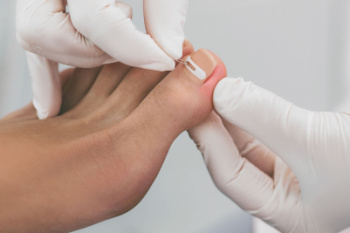
Chronic ingrown toenails can be a persistent and painful foot condition. They occur when the edge of the toenail, usually on the big toe, grows into the surrounding skin, leading to discomfort, swelling, redness, and sometimes infection. While an occasional ingrown toenail is common and often manageable at home, chronic ingrown toenails are a recurring problem. Several factors can contribute to chronic ingrown toenails, including improper nail trimming, wearing tight or ill-fitting shoes, genetics, and underlying foot deformities. Over time, chronic ingrown toenails can lead to pain and discomfort, making it difficult to walk and wear shoes comfortably. Treatment options for chronic ingrown toenails may include gently lifting the ingrown edge of the nail and placing cotton or dental floss under the nail to encourage it to grow away from the skin. In more severe cases, a podiatrist may need to trim or remove the ingrown portion of the nail, and in some instances, surgery may be necessary to permanently correct the problem. If you have ingrown toenails and you are experiencing pain or if it is a repeated issue, it is suggested that you schedule an appointment with a podiatrist for treatment and proper management of this condition.
Ingrown toenails can become painful if they are not treated properly. For more information about ingrown toenails, contact Deann Hofer Ogilvie, DPM of Ascend Foot & Ankle Center. Our practitioner can provide the care you need to keep you pain-free and on your feet.
Ingrown Toenails
Ingrown toenails occur when a toenail grows sideways into the bed of the nail, causing pain, swelling, and possibly infection.
Causes
- Bacterial infections
- Improper nail cutting such as cutting it too short or not straight across
- Trauma to the toe, such as stubbing, which causes the nail to grow back irregularly
- Ill-fitting shoes that bunch the toes too close together
- Genetic predisposition
Prevention
Because ingrown toenails are not something found outside of shoe-wearing cultures, going barefoot as often as possible will decrease the likeliness of developing ingrown toenails. Wearing proper fitting shoes and using proper cutting techniques will also help decrease your risk of developing ingrown toenails.
Treatment
Ingrown toenails are a very treatable foot condition. In minor cases, soaking the affected area in salt or antibacterial soaps will not only help with the ingrown nail itself, but also help prevent any infections from occurring. In more severe cases, surgery is an option. In either case, speaking to your podiatrist about this condition will help you get a better understanding of specific treatment options that are right for you.
If you have any questions please feel free to contact our office located in Lafayette, CO . We offer the newest diagnostic and treatment technologies for all your foot and ankle needs.
